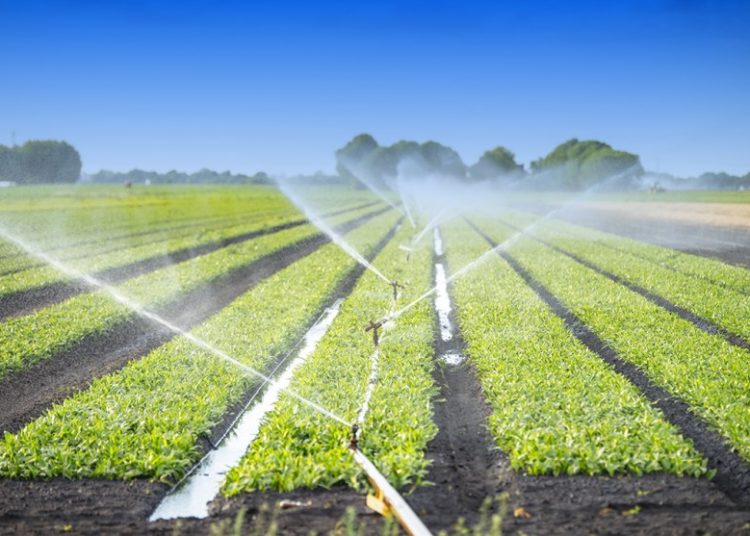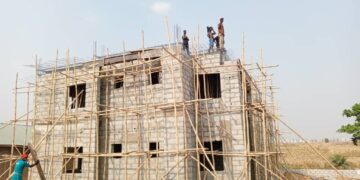Irrigation is considered an essential factor for agriculture and food security and one of the key ways stakeholders believe to combat inadequate rainfall and unavailability of freshwater to boost sustainable year-round crop production in Nigeria, remain to strengthening mechanism towards the application of drip irrigation in farming.
According to experts, unlike other forms of irrigation such as sprinklers that are only considered to be 65-75 per cent efficient, drip irrigation is 90 percent efficient at allowing plants to use the water applied as it reduces runoff and evaporation.
Statistics show that approximately 70 per cent of global freshwater consumption is used in the agriculture sector but water use efficiency in many countries especially Nigeria is below 50 per cent.
The Food and Agriculture Organisation (FAO) forecasts that by the year 2050, global water requirements for agriculture will increase by 50 per cent. To meet the increasing food demands of a growing population global freshwater is becoming increasingly scarce, due to improper management, indiscriminate use and effects of climate change as water scarcity and quality problems are therefore a serious challenge to future food security and environmental sustainability.
To be able to feed the ever growing population, and improve on its foreign earnings in agriculture, Nigeria needs to encourage its farmers to adopt drip irrigation system as a leeway way to boost resilience and sustainable crop production through training and sensitisation.
This is significant because drip irrigation process especially its application in drier areas of the country will help prevents disease by minimizing water contact with the leaves, stems, and fruit of plants, it allows the rows between plants to remain dry, it improves access and reduces weed growth, it also saves time, money, and water because the system is efficient.
Other benefits farmers could derive from the process includes; decrease in labour, increase effectiveness on uneven ground, reduce leaching of water and nutrients below the root zone.
Speaking at an inception workshop to familiarise famers with the operations of the pilot project of drip irrigation technology in Abuja, minister of water resources, Engr Suleiman Adamu said addressing most of the challenges facing irrigation system in Nigeria necessitated a critical shift from improper water management practice to a more sustainable land and water management approaches,
According to Engr Adamu, this can be achieved through the initialisation and promotion of technologies that includes the optimisation of agricultural water management which will support the intensification of crop production and the preservation of land and other natural resources.
Engr Adamu who was represented by the director, water quality control and sanitation, Emmanuel Olusola added, “Farmers need to be trained towards reducing dependency on rain-fed agriculture through sustainable and efficient use of water resources particularly for irrigation”.
In the same vein, FAO country representative, Fred Kafeero said the promotion of drip irrigation in Nigeria will provide an enabling and attractive environment that will bring more youths, peasant farmers and other vulnerable groups to engage in the production of high-value crops through the utilisation of cheaper and simpler irrigation technologies that can be operated and maintained with very minimum training.
Kafeero who was represented by the deputy country representative, Abubakar Suleiman stated, “It is important not to overlook the need to find solutions on the improvement in handing water resources with proper water use policies and regulation, including the optimisation of irrigation scheduling and more efficient irrigation system, such as drip technology”.
The FAO which is providing technical assistance for the promotion of pilot drip irrigation system under Hadejia Jama’are River Basin Development Authority located at Gari Irrigation Project noted that the organisation will provide further support to the federal government and guide adaptation across other River Basin Development Authorities (RBDAS) in Nigeria.
Similarly, director, irrigation and drainage, ministry of water resources, Engr Esther Oluniyi said federal government is making efforts to promote food security and sustainable water management for irrigated agriculture towards producing more crop per drop of water.
She added, “The pilot drip irrigation initiative is to compare low energy drip based irrigated system side by side gravity canal, flood based irrigated system with the view to come up with some irrigation parameters such as; volume of water use, quantity of crop produced, cost of power, cost of labour”.
On his part, president of All Farmers Association of Nigeria (AFAN ), Arc Kabir Ibrahim said in order to sustainably attain food security, Nigeria must augment the traditional rain-fed agriculture generally practice today with irrigation as done in countries where immense progress in food sufficiency has been made.











